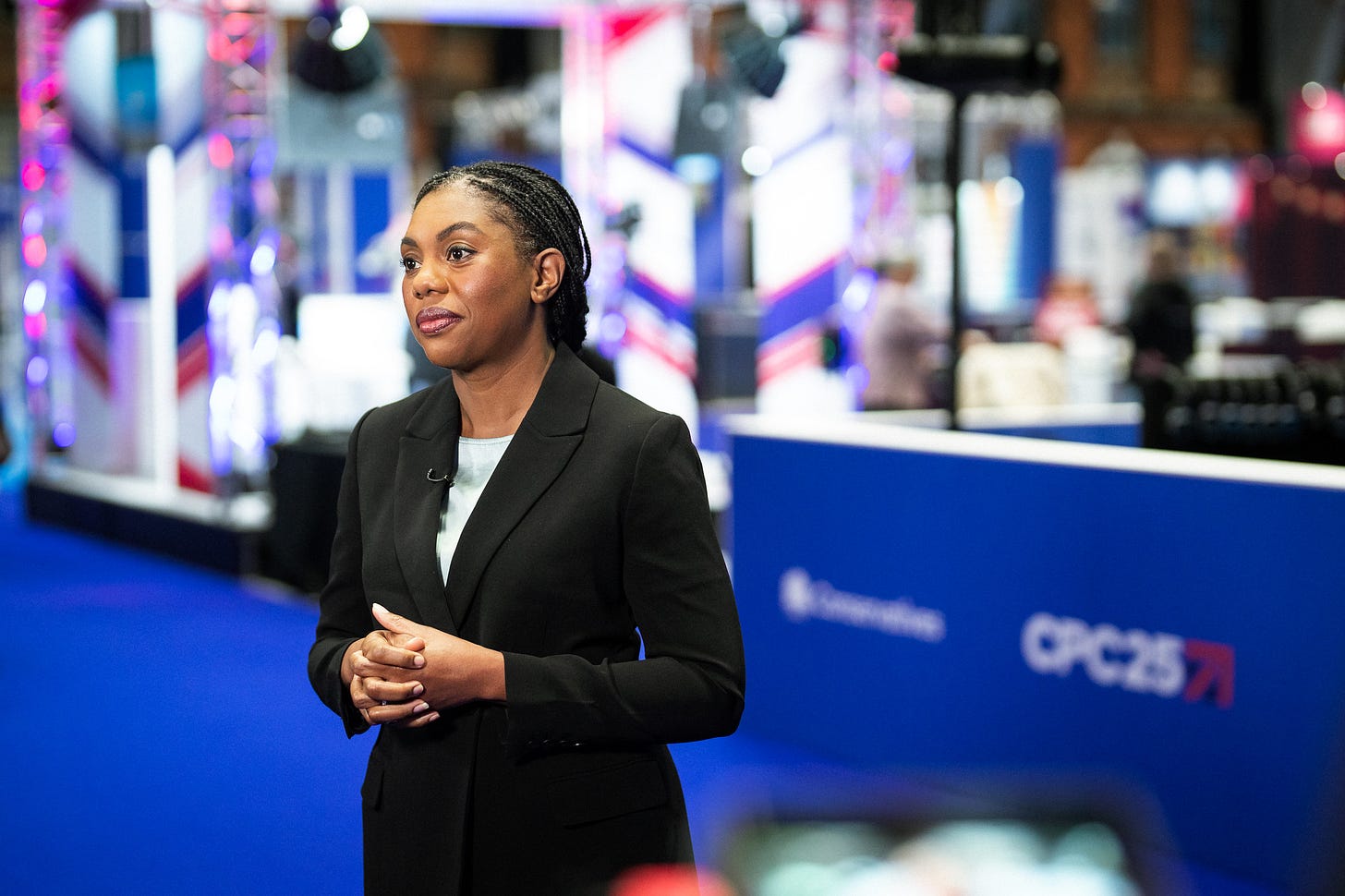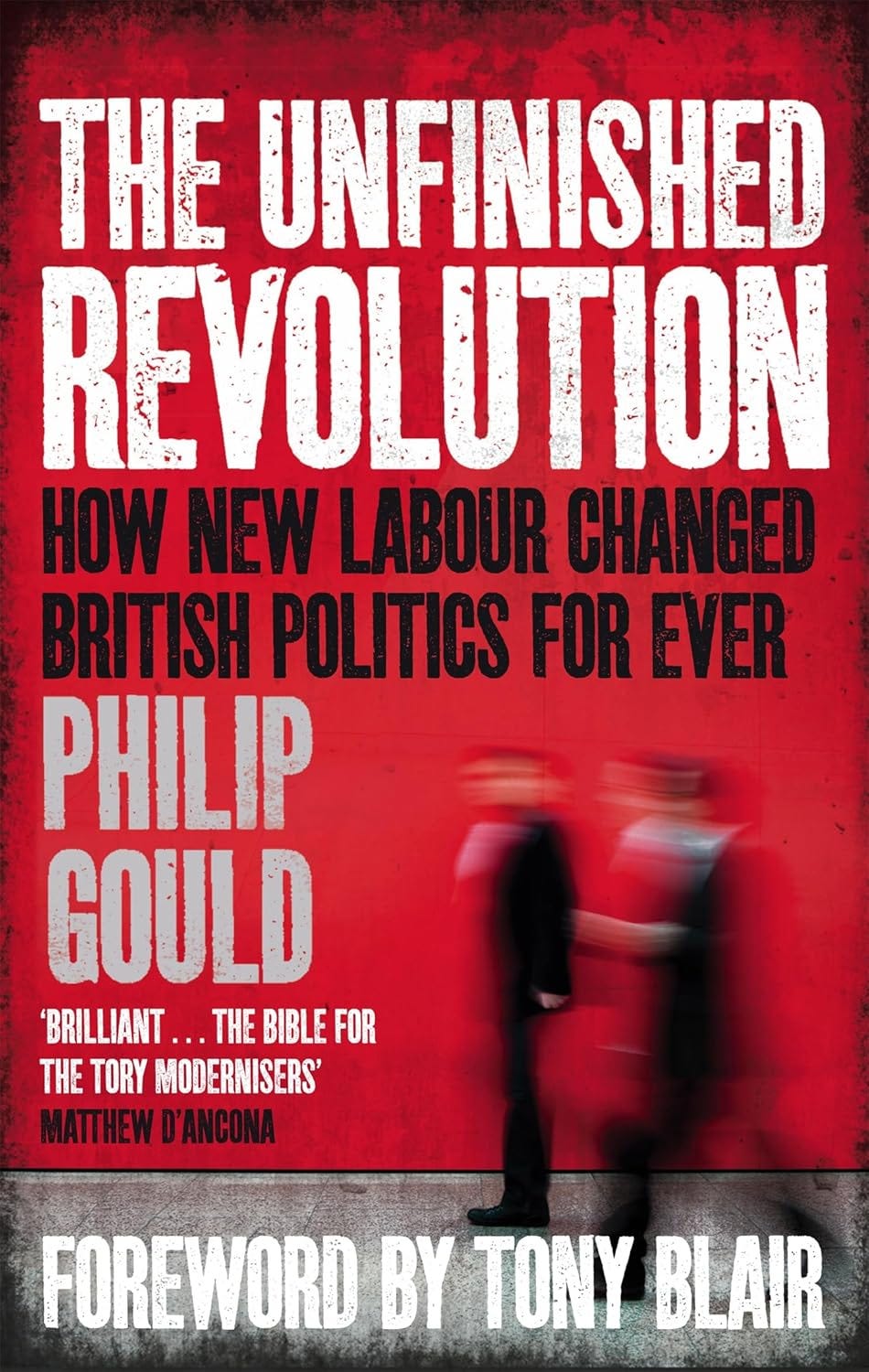The trappings of opposition
Kemi Badenoch likes the freedom of opposition — but is less keen on the heavy lifting
Lines To Take is entering a new chapter.
Starting next Monday, free subscribers will receive previews and one full piece each week. Paid members will get access to five in-depth articles weekly, along with exclusive perks. And for those who want to go further, a special Founding Member tier will include all that, plus additional opportunities to connect and help shape the future of Lines To Take.
I’m excited to keep writing independently — and even more so to have you with me in this next stage.
Full details (and the chance to sign up) will be in tomorrow’s newsletter.
Thanks,
Jack
For many years, the conventional wisdom in Westminster dictated that veteran Labour MP Harriet Harman was a “humourless feminist”. There was more than a whiff of misogyny about this. Not least when Harman — no doubt with the help of her adviser and sometime stand-up comedian Ayesha (now Baroness) Hazarika — was more than capable of landing a decent punchline.
My favourite came during the 2010 Queen’s Speech when, as acting deputy leader, Harman took aim squarely at the Liberal Democrats. The party, thrust into government for the first time in decades and led by future Mark Zuckerberg bag-carrier Nick Clegg, had requested that it hold on to “Short money”. That is, funding to support opposition parties in carrying out their parliamentary duties. Harman remarked:
Some say that the Liberal Democrats like to be all things to all people. But even they can’t be both in government and in opposition. They can’t fudge this one. They are in government — they can’t claim Short money. We’re all familiar with the notion of clinging on to the trappings of power. But the Liberal Democrats are surely the first party to attempt to cling onto the trappings of opposition.
Start with an honest analysis
The reality is that there is little to be said for being in opposition, even in a democracy such as Britain where the security services are unlikely to come knocking in the night. In opposition, saying is all you can do. It reminds me of a terrific scene in The Sopranos between Tony and Carmella who, lying in bed, are trying to work out how to punish their daughter for some infraction:
Carmela: There has to be consequences.
Tony: And there will be, I hear you ok? Let’s just not “overplay” our “hand” because if she finds out we’re powerless, we’re f****ed.
The only benefit of being in opposition is time. But there is no guarantee that will be spent well. In his foreword to Philip Gould’s masterpiece, Unfinished Revolution, Tony Blair sets out 10 lessons. The first is probably the most important, and certainly the most relevant for Kemi Badenoch: “Start with an honest analysis of why you are in opposition, not in government.”
Obviously, engaging with that question does not automatically deliver results. I mean, Labour lost the 2015 general election and promptly made Jeremy Corbyn its leader! The Tories for their part lost badly in 2001 and opted for Iain Duncan Smith over Ken Clarke. But still.
Even after Badenoch’s conference speech, which went down well in the hall and seems to have solidified — for now — her position as Conservative leader, can we see the early signs of anything approaching an honest analysis?
Stamp duty
The big headline from the speech was her announcement on abolishing stamp duty. Needless to say, from a strictly economic perspective, stamp duty is a terrible tax. It distorts the housing market, penalises people who want to move and reduces labour mobility. It is not for nothing that the Institute for Fiscal Studies’ Paul Johnson calls it “the worst tax that we have”.
But “The next Conservative government will abolish stamp duty on your home” is not a complete sentence. It’s like someone saying “My boss, in a chicken costume” before drifting off. Or overhearing half a phone call and only catching “… because I thought it was cheese.” What will you replace it with? A particularly strange omission when Badenoch is trying to reposition the Conservatives as the party of “fiscal responsibility”.
An honest analysis of why you’re in opposition does not in itself preclude a bit of opportunism. All parties out of office get to indulge in a little magical thinking. How many times did Labour under Ed Miliband say it would spend the bankers’ bonuses tax? Or David Cameron taking no obvious position on nuclear power. But there is a limit.
What else could she be doing?
There is a reason why the markets did not react to Badenoch’s speech in the way they did to Rachel Reeves’ tears (a little bit) or Liz Truss’s mini-Budget (rather a lot). Badenoch is not in office, and may not even be Tory leader by the time of the next election. Success for her, like Labour in 1983, will be for the party to remain the official opposition come 2029.
Still, it is interesting what she has chosen not to do. That is, Badenoch did not condemn Robert Jenrick’s latest foray into racial politics, after the shadow justice secretary and permanent leadership contender said that he “didn’t see another white face” during a visit to Handsworth, a suburb north of Birmingham.
Nor did she did focus on one of the few issues on which voters credit the last Conservative government, and where Nigel Farage has a gaping weakness: support for Ukraine.
The fundamentals
Keir Starmer and Kemi Badenoch both went into conference season with low poll ratings and plotting leadership rivals. Each has come out not only unscathed, but enhanced. Yet British politics is not an episode of The West Wing. No one is a peroration away from changing minds, let alone improving the OBR’s fiscal forecasts.
Come late November, Reeves is going to deliver a Budget with anywhere from £15bn to £50bn of tax rises. This from a chancellor who only last year told business she wouldn’t be coming back for more, and will now try to claim that various downgrades to growth were unforeseeable. As if Donald Trump hadn’t maintained a fairly consistent poll lead over Kamala Harris last October — and the only thing he has ever consistently loved more than himself is tariffs.
Back in 2010, Harman was needling the Lib Dems for wanting to enjoy both ministerial cars and opposition funds. Today, Badenoch too wants to enjoy the trappings of opposition — with its freedom to posture and write cheques she can’t cash — but without doing the honest analysis of why her party is there in the first place.






Sound piece. Arguably, it took the consumption of Capt. IDS & Mr “Something of the Night” before the Tories got serious in the early noughties. No press comment, I see, about what KB’s stamp duty wheeze will do to house prices. They are fairly valued (no more!) currently. Aren’t they?